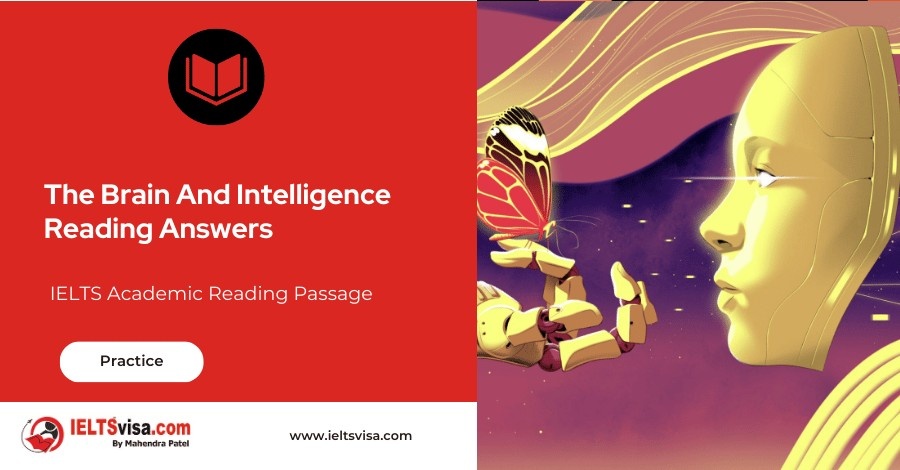The Brain And Intelligence Reading Answers
IELTS Academic Reading Passage
- Human intelligence is an elusive quality. We all think we know it when we see it but try to pin down that quality to a firm, testable definition and suddenly, even for the most experienced researchers, the concept disappears. But now a team of British and German scientists believe they have firmly nailed down at least part of the notion of intelligence. They claim to have found a location for intelligence, whatever it is, in the brain.
- For many years researchers have believed that intelligence is a quality which is spread throughout the whole human brain. Traditional psychologists such as Benjamin Martin believe that this accounts for incidences where physical damage to the brain need not affect intelligence at all. By using advanced scanning equipment, however, researchers led by John Duncan of the Cognition and Brain Sciences Unit in Cambridge now think that it is much more localised and at the front of the brain in particular.
- Duncan and his team have attempted to link intelligence to the activity of nerve cells in the brain by giving subjects a series of problem solving tests. These tests are of the standard sort used to test and measure intelligence. They resemble puzzles where sequences of numbers or letters have to be rearranged or continued, or patterns of shapes have to be inverted. While subjects are carrying out these intelligence tasks, their heads are scanned to see where electrical activity and blood flow in the brain are concentrated. It turns out that activity was concentrated in the frontal cortex and so, Duncan and his team presume, intelligence is situated there too.
- This new idea has not been met with universal acceptance, however. The usual definition of “intelligence” was set by Charles Spearman 100 years ago. This was the quality that allows some people to be very good at a whole variety of things – music, mathematics, practical problem solving and so on – while others are not. He called this quality general intelligence or the “g” factor for short. It was a contentious idea even at the time but still no-one has come up with a better definition. Nonetheless, because the notion of intelligence is imprecisely defined, the idea that there is a fixed location for intelligence has to be questioned.
- The questioning comes in an article in the prestigious journal Science, the same edition as Duncan’s own article. Yale psychologist Robert Stemberg points out that many people, who are clearly intelligent, such as leading politicians and lawyers, do very badly in intelligence tests. Conversely, one might argue, there are plenty of academics who are good at intelligence tests but who cannot even tie their own shoe laces! Sternberg implies that the idea, that being a successful politician or lawyer does not require intelligence, flies in the face of reason. Rather more likely is the idea that so-called intelligence tests can have little to do with many practical manifestations of intelligence. The skills of verbal and mathematical analysis measured by these tests can tell us very little about the skills of social interaction and people handling which are equally essential for success and are, therefore, equally valid qualities of intelligence.
- Sternberg makes a further criticism of the conclusions drawn by Duncan’s team. The mental-atlas approach really does not tell us anything about intelligence. The fact that we know a computer’s “intelligence” is produced by a computer chip and that we can say where this chip is, does not tell us anything about the computer’s intelligence or ability. We could easily move the location of the chip and this would not change the computer’s “intelligence”. As Benjamin Martin points out, this may be what happens in reality when following physical damage to one area of the brain, knowledge and ability appear able to relocate.
Questions 1-8:
Reading Passage has three sections, A-C.
Choose the correct option for each question from the list of statements below.
Write the correct number A to E on your answer sheet.
Classify the following statements as referring to
A. John Duncan
B. Charles spearman
C. Benjamin martin
D. Robert Sternberg
E. The writer of the Article
For example, physical damage to the brain need not affect intelligence.
Answer: C
- Intelligence can be located throughout the brain.
- Intelligence makes people excellent at various things.
- Intelligence tests examine limited skills.
- The intelligence of humans is located in the frontal part of the brain.
- It is very hard to describe what intelligence can be.
- Intelligence testing methods can be a bad measurement for measuring the intellect of professionals.
- Intelligence and other capabilities can dislocate the following injury to the brain.
- Intelligence is a feature required by those doing well in legal and political professions.
Question 9-13:
9. Spearman’s suggested that intelligence was the ability to be good at……
10. The idea that all politicians and lawyers are unintelligent is……………
11. Spearman’s ideas about intelligence are not…………
12. Sternberg suggests that in addition to academic ability, intelligence includes……….
13. Sternberg also believes that intelligence is not affected by where…….

Solution For: The Brain And Intelligence
Reading Answers
| 1. C | 8. E |
| 2. B | 9. variety of things |
| 3. E | 10. contentious |
| 4. A | 11. conventional |
| 5. E | 12. people handling ability |
| 6. D | 13. it is located |
| 7. C |
Review and Practice
- Regularly practice with IELTS reading samples and time yourself to get used to the pressure of the exam.
- Review your mistakes to understand where you went wrong and how to avoid similar errors in the future.
Our Books
Master IELTS Speaking Part 1
IELTS Writing Task 1 Book
IELTS Writing Task 2 Book
The Brain And Intelligence Reading Answers
Comin Soon
Practice IELTS Other Modules
IELTS Listening
The IELTS Listening test assesses how well you can understand spoken English in various contexts. It lasts about 30 minutes and is divided into four sections with a total of 40 questions. The listening tasks become increasingly difficult as the test progresses.
IELTS Academic Reading
The IELTS Academic Reading section assesses your ability to understand and interpret a variety of texts in academic settings. It is designed to evaluate a range of reading skills, including skimming for gist, reading for main ideas, reading for detail, understanding inferences, and recognizing a writer's opinions and arguments.
IELTS Speaking
The IELTS Speaking test assesses your ability to communicate in English on everyday topics. It lasts 11-14 minutes and consists of three parts: introduction, cue card, and a discussion based on the cue card topic.
IELTS General Reading
IELTS General Reading tests your ability to understand and interpret various types of texts. Here are some key areas and types of content you can expect to encounter in the reading section, along with tips for effective preparation.
IELTS Academic Writing Task 1
In IELTS Academic Writing Task 1, you are presented with a visual representation of information, such as graphs, charts, tables, or diagrams, and you are required to summarize, compare, or explain the data in your own words.
IELTS General Writing Task 1
In IELTS General Writing Task 1, you are required to write a letter based on a given situation. The letter can be formal, semi-formal, or informal, depending on the prompt. Here’s a breakdown of the key components to include in your letter
IELTS Academic Writing Task 2
In IELTS Academic Writing Task 2, you are required to write an essay in response to a question or topic. Here’s a guide to help you understand the essential elements of this task
IELTS Exam Tips
To succeed in the IELTS exam, practice regularly, familiarize yourself with the test format, improve your vocabulary, develop time management skills, and take mock tests to build confidence.
Grammer for IELTS
Grammar is the foundation of effective communication in English. Understanding tense usage, subject-verb agreement, and sentence structure enhances clarity and coherence in writing and speaking.
Vocabulary for IELTS
Vocabulary plays a crucial role in the IELTS (International English Language Testing System) exam, especially in the Speaking and Writing sections. Here’s an overview of why vocabulary is important and how it impacts your performance
RECENT IELTS SAMPLES QUESTIONS AND ANSWERS
Walking with dinosaurs
Peter L. Falkingham and his colleagues at Manchester University are developing techniques that...
Money as the Unit of Amount Reading Answers
The most difficult aspect of money to understand is its function as a unit of account. In...
WEATHERING IN THE DESERT
In the deserts, as elsewhere, rocks at the earth's surface are changed by weathering, which...
Nature on Display in American Zoos
The first zoo in the United States opened in Philadelphia in 1874, followed by the Cincinnati...
Can We Prevent the Poles From Melting
Such is our dependence on fossil fuels, and such is the volume of carbon dioxide we have...
Air conditioning the earth reading answers
The circulation of air in the atmosphere is activated by convection, the transference of heat...













